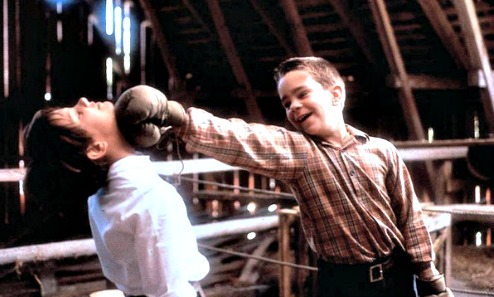Available on Blu-Ray now.
“There’s always someone worse off than you.” How many times will you hear that in the course of your life, or try and hammer it through your own head during tough times? In the case of troubled young Ingemar (Anton Glanzelius) it could be his mantra, as, already fatherless, he deals with being separated from his terminally-ill mother due to the strain his odd behaviour has had on any chance of convalescence.
Based on a semi-autobiographical novel by Reidar Jönsson, this celebrated film (a rare 100% on Rotten Tomatoes) thrust director Lasse Hallström into the limelight and a mixed career of eccentric indies (What’s Eating Gilbert Grape), and Nicholas Sparks adaptations (Dear John, Safe Haven). This is still considered his finest work and for good reason.
This is a coming-of-age film that doesn’t sand off the rough edges of youth in the service of empty reminiscence. Ingemar feels adrift in a world that feels confusing and terrifying. As such, the story of Laika, the first dog in space resonates with him as one with which he can identify, and one to which he can compare his situation positively. The narration by Ingemar feels a little forced – adult profundity forced into the mouth of a child – but this central metaphor is a potent one, getting across a burgeoning sense of insignificance in the grand scheme of things, and the current inability to accept things upon outwith his sphere of influence.
Of course, childhood is always open to new wonders, and Ingemar finds them in abundance when sent to live with his playful uncle Gunnar (Tomas von Brömssen) in a small town in Småland. Like a less malevolent Twin Peaks, his new dwelling is seemingly inhabited by lovable eccentrics, like Fransson who is constantly mending his roof, and an old man who lives downstairs who likes to have the lingerie catalogue read to him.
It risks descending into schmaltz, but avoids this through the touching relationships Ingemar forms with his uncle, and especially tomboy Saga (Melinda Kinnaman). Ingemar and Saga’s tentative friendship and attraction is sweet and unforced, and is easily the highlight of the film. The relaxed Scandinavian attitude to sex and depictions of nudity means that there is one aspect in particular to their friendship that British viewers find a little shocking, but there is a refreshing frankness in the storytelling that many similar tales avoid.
My Life as a Dog is at its best when depicting its central relationships and the positive effect is has on the young boy. For the most part, the studied eccentricity doesn’t mesh as well with the narrative as in the likes of Fellini’s Amarcord, which mines similar veins of nostalgia. That said, it is a rather lovely tale, thoroughly evocative of a time and place, and Ingemar’s little triumphs are mirrored nicely in contemporary radio footage of Ingemar Johansson’s boxing victory over Floyd Patterson.
